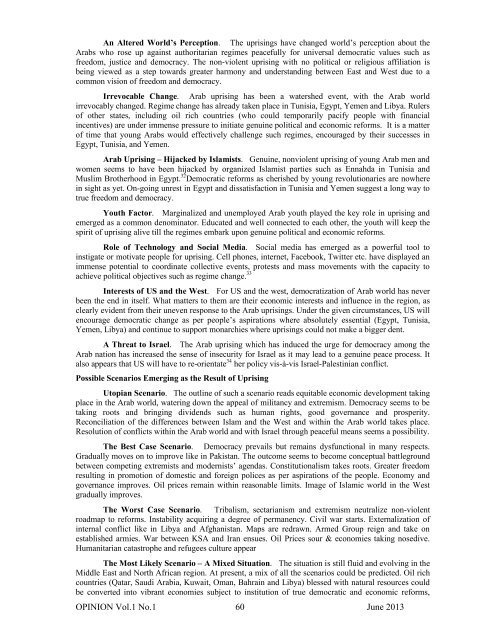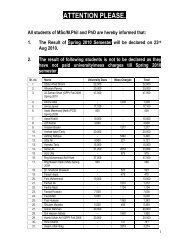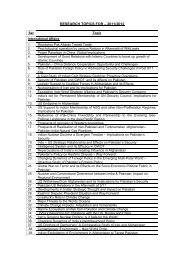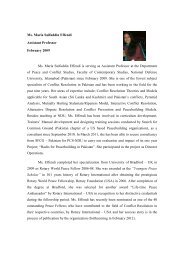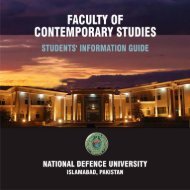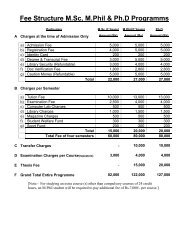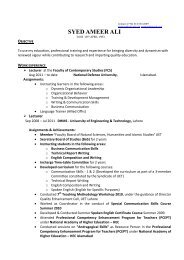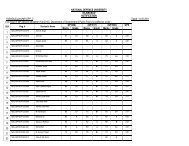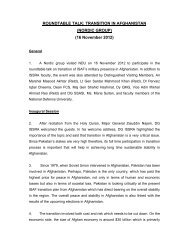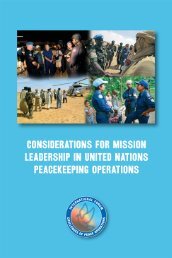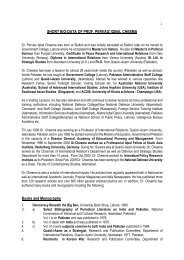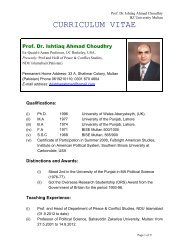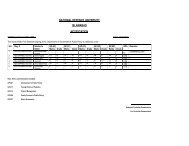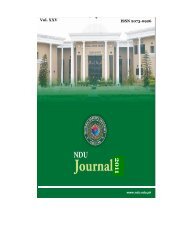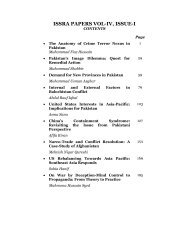OPINION Vol.1, No.1 June 2013 - National Defence University
OPINION Vol.1, No.1 June 2013 - National Defence University
OPINION Vol.1, No.1 June 2013 - National Defence University
Create successful ePaper yourself
Turn your PDF publications into a flip-book with our unique Google optimized e-Paper software.
An Altered World’s Perception. The uprisings have changed world’s perception about the<br />
Arabs who rose up against authoritarian regimes peacefully for universal democratic values such as<br />
freedom, justice and democracy. The non-violent uprising with no political or religious affiliation is<br />
being viewed as a step towards greater harmony and understanding between East and West due to a<br />
common vision of freedom and democracy.<br />
Irrevocable Change. Arab uprising has been a watershed event, with the Arab world<br />
irrevocably changed. Regime change has already taken place in Tunisia, Egypt, Yemen and Libya. Rulers<br />
of other states, including oil rich countries (who could temporarily pacify people with financial<br />
incentives) are under immense pressure to initiate genuine political and economic reforms. It is a matter<br />
of time that young Arabs would effectively challenge such regimes, encouraged by their successes in<br />
Egypt, Tunisia, and Yemen.<br />
Arab Uprising – Hijacked by Islamists. Genuine, nonviolent uprising of young Arab men and<br />
women seems to have been hijacked by organized Islamist parties such as Ennahda in Tunisia and<br />
Muslim Brotherhood in Egypt. 32 Democratic reforms as cherished by young revolutionaries are nowhere<br />
in sight as yet. On-going unrest in Egypt and dissatisfaction in Tunisia and Yemen suggest a long way to<br />
true freedom and democracy.<br />
Youth Factor. Marginalized and unemployed Arab youth played the key role in uprising and<br />
emerged as a common denominator. Educated and well connected to each other, the youth will keep the<br />
spirit of uprising alive till the regimes embark upon genuine political and economic reforms.<br />
Role of Technology and Social Media. Social media has emerged as a powerful tool to<br />
instigate or motivate people for uprising. Cell phones, internet, Facebook, Twitter etc. have displayed an<br />
immense potential to coordinate collective events, protests and mass movements with the capacity to<br />
achieve political objectives such as regime change. 33<br />
Interests of US and the West. For US and the west, democratization of Arab world has never<br />
been the end in itself. What matters to them are their economic interests and influence in the region, as<br />
clearly evident from their uneven response to the Arab uprisings. Under the given circumstances, US will<br />
encourage democratic change as per people’s aspirations where absolutely essential (Egypt, Tunisia,<br />
Yemen, Libya) and continue to support monarchies where uprisings could not make a bigger dent.<br />
A Threat to Israel. The Arab uprising which has induced the urge for democracy among the<br />
Arab nation has increased the sense of insecurity for Israel as it may lead to a genuine peace process. It<br />
also appears that US will have to re-orientate 34 her policy vis-à-vis Israel-Palestinian conflict.<br />
Possible Scenarios Emerging as the Result of Uprising<br />
Utopian Scenario. The outline of such a scenario reads equitable economic development taking<br />
place in the Arab world, watering down the appeal of militancy and extremism. Democracy seems to be<br />
taking roots and bringing dividends such as human rights, good governance and prosperity.<br />
Reconciliation of the differences between Islam and the West and within the Arab world takes place.<br />
Resolution of conflicts within the Arab world and with Israel through peaceful means seems a possibility.<br />
The Best Case Scenario. Democracy prevails but remains dysfunctional in many respects.<br />
Gradually moves on to improve like in Pakistan. The outcome seems to become conceptual battleground<br />
between competing extremists and modernists’ agendas. Constitutionalism takes roots. Greater freedom<br />
resulting in promotion of domestic and foreign polices as per aspirations of the people. Economy and<br />
governance improves. Oil prices remain within reasonable limits. Image of Islamic world in the West<br />
gradually improves.<br />
The Worst Case Scenario. Tribalism, sectarianism and extremism neutralize non-violent<br />
roadmap to reforms. Instability acquiring a degree of permanency. Civil war starts. Externalization of<br />
internal conflict like in Libya and Afghanistan. Maps are redrawn. Armed Group reign and take on<br />
established armies. War between KSA and Iran ensues. Oil Prices sour & economies taking nosedive.<br />
Humanitarian catastrophe and refugees culture appear<br />
The Most Likely Scenario – A Mixed Situation. The situation is still fluid and evolving in the<br />
Middle East and North African region. At present, a mix of all the scenarios could be predicted. Oil rich<br />
countries (Qatar, Saudi Arabia, Kuwait, Oman, Bahrain and Libya) blessed with natural resources could<br />
be converted into vibrant economies subject to institution of true democratic and economic reforms,<br />
<strong>OPINION</strong> <strong>Vol.1</strong> <strong>No.1</strong> 60 <strong>June</strong> <strong>2013</strong>


